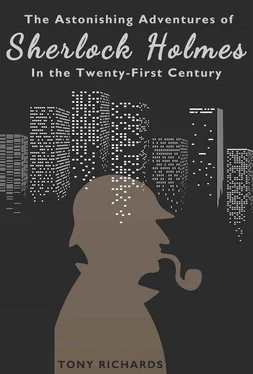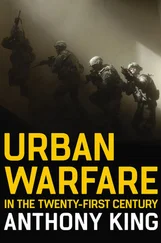The skies flashed. And a lightning bolt did indeed strike down at him.
But not entirely with the same consequences as the last time Holmes had watched.
Still up on the boulder, Krane’s body went rigid. His hair stood out around his head. The colour was bled from his features, which looked utterly amazed.
The second bolt galvanised his limbs, so that they shuddered uncontrollably. His mouth flew open and his tongue came poking out. His eyes bulged from their sockets.
After the next bolt had struck him, he collapsed atop the boulder. Smoke was rising from him, and he was completely still.
But the entity above was not altogether finished with him. Lightning continued to blast down. Holmes watched with open distaste as the man’s body was turned into a blackened shell, which gradually shrank in on itself until it crumbled into dust.
Another wind, a spiralling one, blew up. The embers were whisked aloft, and disappeared into the heavens.
They were all that remained of Eli Krane. And now his masters had them. They had his soul as well, presumably. And what they’d do with it? Well, perhaps it was better not to know.
The shape above Holmes vanished, and the dark clouds started to disperse.
A while later, while a rather perplexed Sheriff Moore was tightening the bolts on the new tyre, Holmes found himself comforting Amy Hamilton. He did it gladly.
“Is it really over?” she sobbed into his shoulder.
“Absolutely.”
“But Krane, he had such incredible power.”
“Yes. And he forgot the oldest rule of all.”
When she stared up at him, mystified, Holmes allowed himself a small, tight smile.
“All power comes at a price. And the greater it is, the higher the tariff. Men like Krane believe themselves immune to that, and end up paying a tremendous cost. And, fortunately for the rest of us, that is the way that it has always been.”
There was a serpent in Paradise. Or – to be more accurate – there was a steady string of unexplained deaths in that location, which was just as troubling.
Sherlock Holmes stood in the tiny morgue of the little hospital at the heart of Santa Augustina’s small capital, Jarvistown. He stared down at the pair of bodies on the mortuary slab, a faint touch of dismay crossing his normally stoic face. They had obviously been worked at very thoroughly by the local coroner. Their chests were disfigured by the usual Y-shaped scars and stitching, and it was obvious that the tops of their skulls had both, at some point, been removed.
“A cause of death cannot be found, you say?”
“Not a hint of one. Exactly like in all the other cases.”
Holmes swivelled around to face the man who’d brought him here. Captain Blessed Williams was a police officer after his own heart. He was a massive Caribbean man who stood at six foot five. But – unlike most of his fellow islanders – there was nothing in the least bit casual about him. His every word and movement was precise. He’d brought along a thick ream of case files for Holmes to inspect. And there was a gleam of steely determination in his gaze that the great detective recognised only too well … he saw it sometimes in his own expression, when he happened perchance to glance into a mirror.
Captain Williams was not dressed casually either. He was wearing an immaculately pressed beige linen suit, a proper shirt and tie and brown shoes of extremely lightweight leather. His only real concession to the stifling heat and humidity of his home island was a straw hat cocked a little jauntily atop his head. Holmes could not help but notice that there was a cockerel feather stuck into the stripey fabric band.
He returned his attention to the pair of corpses. Apart from the autopsy scars, they looked almost peaceful in repose. They were a man and a woman, both of them no older than their early thirties. Both of them handsome and the picture of good health. Their limbs were firm, their faces untouched by the ravages of age. And they both were tanned a deep gold-brown colour by the Caribbean sun.
According to the coroner, they’d both died very closely together, temporally. Possibly at nearly the same moment.
But the truly odd thing was that they’d been staying at separate hotels, and were not even officially a couple. The man was Michael Dowd from Baltimore. The woman was Marjorie Trenton from Calgary, Canada. By all the witnesses’ accounts, they’d only met six days ago.
“A whirlwind romance, you say?”
“The way the staff at both the Neptune and the Regency describe it, they couldn’t keep their hands off each other,” Williams assured him. “Such things are not uncommon on vacation, obviously. I checked with relatives in both their hometowns, and apparently they both had been through recent break-ups with their long-term partners.”
“So they came here on their own, adrift, forlorn …?”
“And found new life and love amongst each other. But such stories should have happy endings, Mr Holmes. Not ones like this.”
The tone in which the man said that informed Holmes that – in spite of his sharp and businesslike appearance – Captain Williams harboured a romantic aspect to his soul.
“It’s very sad, yes,” he agreed. “But what about the others?”
All the rest had perished individually. They were single, or divorced. Nine of them in total, over the course of the past eighteen months, the oldest of them forty-two. Four men. Five women. Holmes took the files that were presented to him, flipped them open, and studied the photographs of the dead faces, one by one. There had been no obvious cause for their deaths either.
“Two of these are British,” he pointed out, slightly affronted. “One of them is French. Another Dutch. And there is nothing, either by way of background or of occupation, to link any of them.”
“Save the two simple facts that they came here, and they are now dead,” the captain added.
Which got him a slightly annoyed look from Holmes, since he had just stated the obvious. It was the opposite of obvious that they were looking for, and both men knew it.
Holmes stared at the couple one last time, shaking his head sadly, and then turned away towards the mortuary door, leaving Captain Williams with no choice but to follow him.
“We’ll not find what we’re looking for in here,” the great detective said.
They proceeded along a short corridor, the paint of its walls blistering, then went out through another door into bright, dazzling sunlight. Holmes was forced to pause for a few seconds, blinded, trying to let his eyes adjust. But even while his sight was impaired, his other finely tuned senses remained in play. He could hear gentle reggae music drifting from what he imagined was a nearby bar. And his large, hooked nose – like that of an Apache Indian – was picking up a wide variety of scents. The cinnamon tang of tropical dust. The smell of cut ripe fruit. A touch of sea salt, and a hint of chicken being grilled. And then, out beyond all that, sweet pollen and lush green vegetation.
His eyelids came back open slowly, and his gaze confirmed what his olfactory senses had already told him.
Santa Augustina was one of the southernmost of the Caribbean group. It had been owned by the British during most of the Imperial years but – due to the latitude where it was situated – it had Spanish influences too. He could see a cross atop a Catholic church not far in the distance, the yellow and white papal banner fluttering beside it. Some of the locals here had Spanish names, and their cooking had a slight Hispanic influence. But that, he thought,was not the point.
Whatever history it had, this place was genuinely a paradise. It was a tiny island, in reality no more than a small mountain which had poked its way out of the sparkling sapphire waters. Beyond the flat rooftops of the capital, he could make out steeply rising slopes, clad in such a thick blanket of verdancy that he could not discern a single patch of barren earth. Wild birds called from that direction, their cries shrill and primal. He could make out clusters of wild flowers of the most profound primary hues. And there was no volcanic opening at the mountaintop. This was one of nature’s very calm and peaceful places.
Читать дальше












